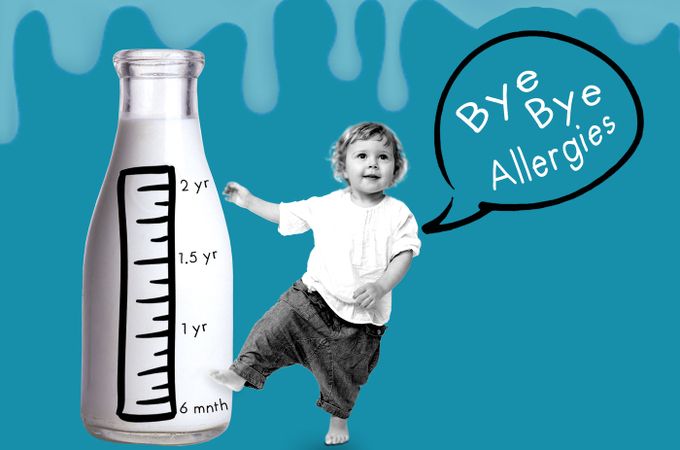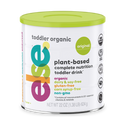Can Toddlers Outgrow a Milk Allergy?
Worried about your child's milk allergy? Explore what a milk allergy is, how it differs from lactose intolerance, potential treatments, and when children typically outgrow it. Find practical tips and alternatives for a dairy-free lifestyle.
Updated July 19, 2024

Discovering your child has a milk allergy can be daunting. With symptoms that can escalate quickly, it's crucial to understand how to manage this condition, especially since dairy is prevalent in many foods. While you may have complete control over your child's diet as an infant, concerns arise as they grow, attend school, or visit friends. The big question: will they outgrow it? Fortunately, many children do outgrow milk allergies.
Let’s explore what a milk allergy is, how it differs from lactose intolerance, key symptoms to watch for, treatment options, timelines for potential outgrowth, and what steps to take if your child continues to have a milk allergy. With modern advancements in allergy diagnosis and treatment, there are plenty of alternatives to ensure your child can thrive without dairy.
» Discover healthy, plant-powered, dairy-free nutrition for healthy growth
What Is a Milk Allergy?
A milk allergy is defined as an allergy to either the casein or whey protein in cow’s milk. It affects 2-3% of all babies but is serious when it does. When a child has a milk allergy, the body’s immune system rejects the cow’s milk protein and releases histamines that cause allergic symptoms. A baby can begin to show signs of a milk allergy at any time. Even if you’re breastfeeding, your child can be exposed to cow’s milk through breastmilk if it’s a part of your diet.
» Learn more about milk allergy in babies to recognize signs & symptoms
If your child has a milk allergy, they may exhibit symptoms that range from serious to life-threatening, including hives, vomiting, abdominal pain, blood in stool, and/or a scaly skin rash, among others. In severe, life-threatening cases, children may have an anaphylactic reaction and experience hypotension or lose consciousness.
Talk to your doctor right away if your child is showing any of these signs. They may perform a skin test or observe your child’s behavior and symptoms to diagnose them appropriately, employ a proper treatment plan, and suggest appropriate formulas that won’t trigger their allergies and are suitable for your 1-year-old child's feeding schedule.
» Here are some milk and dairy alternatives for your little ones
When a Child May Outgrow a Milk Allergy
Although serious, a milk allergy diagnosed in infants is most often not permanent. In fact, many babies outgrow a milk allergy by the time they are one year old, and most children outgrow a milk allergy by three years old. Some may not outgrow a milk allergy until five years old, and other children won’t outgrow it at all.
Milk allergies in babies are serious, and the symptoms can be severe, so always consult your doctor before reintroducing milk and dairy products into your child’s diet.
» Check out these best milk alternatives for sensitive stomachs
What About Lactose Intolerance?
A lactose intolerance is actually quite different from a milk allergy. A lactose intolerance is a digestive system issue, but a milk allergy is a response from the immune system. Lactose intolerance is defined as the inability to digest the naturally occurring sugar in milk, lactose. While a milk allergy onsets early in life and is typically outgrown, a lactose intolerance onsets later in childhood or adolescence and typically progresses as levels of lactase, the enzyme needed to properly digest lactose, naturally decline. In some rare cases, babies are born without lactase and thus are lactose intolerant from birth.
» Try healthy plant-based nutrition for lactose-intolerant kids
In other cases, lactose intolerance may be a symptom of something else. For instance, if your child experienced an infection or was diagnosed with celiac disease (an inability to digest gluten), his or her digestive tract may be irritated and unable to digest lactose for the time being. As your child’s digestive tract heals from damage or irritation, though, they will likely become tolerant of lactose again.
Signs of lactose intolerance in kids include abdominal pain, cramps, gas, diarrhea, and bloating. While less severe than milk allergy symptoms, these symptoms can cause extreme discomfort and should be addressed.
» Discover dairy-free, plant-powered whole nutrition for healthy growth
How to Treat a Milk Allergy or Lactose Intolerance
Unfortunately, a milk allergy cannot be treated. However, like other toddler seasonal allergies, symptoms can be completely abated as long as the allergen is avoided. Today, all food makers are required to clearly state on package labels whether foods contain milk or milk-based products, making our job as parents to protect our children from potentially harmful ingredients much easier.
Early on in your child’s life, avoiding milk and dairy will be completely up to you. If you are still breastfeeding, your doctor will have you eliminate dairy from your diet and may suggest removing other potential allergens from your diet as well. As you wean your child, you may want to choose a fortified formula to help supplement their diet with essential nutrients. At this time, it’s critical to choose a dairy-free option. Consult your pediatrician to find the best option for your child with allergies.
» Discover a healthy alternative for infants with CMPA
As your child grows, continue to feed them a dairy-free diet. Your child will be able to get everything they need from nutritious whole foods, even with dairy out of the mix. Withhold giving your child any cow’s milk or dairy products until your pediatrician suggests they may be safe, and then do so only under careful observation.
» Choose the right nutrition for healthy growth
What to Do if Your Child Doesn’t Outgrow a Milk Allergy
If your child has a milk allergy or is lactose intolerant, it’s critical for their health and comfort to avoid milk and dairy products for as long as they show symptoms. Many parents rely on these dairy products to supply their babies and toddlers with the nutrients they need to grow and develop. However, there are adequate and even better alternatives to milk that will give children the same, if not more, nourishment. With a bit of conscious shopping, you’ll be able to find a dairy-free option that’s right for your child.
Note that most kids who are allergic to cow’s milk are also allergic to goat’s milk, sheep’s milk, and sometimes soy milk as well. When seeking a safe alternative, be sure to steer clear of formulas and foods that contain these ingredients, too.
» Understand which is better: toddler formula or whole milk
Select a Safe, Dairy-Free Alternative
For babies and toddlers who are allergic or intolerant to milk and dairy products, a plant-based formula may be the best option. For children over one-year-old, Else Plant-Based Complete Nutrition is a delicious and vitamin-rich non-dairy nutrition drink that many parents have turned to.
Else is completely safe for your child with a milk allergy or lactose intolerance. It is free from casein and whey (the proteins found in cow’s milk that cause allergic reactions), as well as lactose and soy. Instead, it is made from almonds, buckwheat, and tapioca and is fortified with calcium, vitamin D, and other important vitamins and minerals to support your child’s growth & development.
» Explore plant-powered, dairy-free nutrition for sensitive tummies
Else isn’t just an alternative, though. Regardless of whether or not your child outgrows their allergy to cow’s milk or has one in the first place, you can confidently feed them Else, knowing they are receiving the nutrition they need. It’s the clean, plant-based, and sustainable option you have been waiting for with a delicious taste they want.
As always, if you are seeing milk allergy symptoms in your child, it’s important to talk to your pediatrician before you make any changes that could impact your child’s health. When they recommend a cow’s milk alternative or supplemental nutrition, look to Else.
Enjoy Dairy-Free Life
If your child doesn’t outgrow a milk allergy, the world won’t stop turning. In fact, their life may be even more enjoyable without dairy in the mix; they may even choose a completely plant-based lifestyle, which has been shown to benefit long-term health.
Today, making diet changes to support kids with allergies has never been easier. There are so many incredible and delicious dairy substitutes on the market for anything from milk to cheese to ice cream (hurray!). These dairy-free options will ensure your child never goes without.
For now, in their toddlerhood, provide them with the tastiest, most nutritious milk alternative available. Else Plant-Based Complete Nutrition will promote healthy growth and development during this key time—it’s unlike anything Else.
Sources
The content and advice provided in this article are for informational purposes only and are not a substitute for medical diagnosis, treatment, or advice for specific medical conditions. Always consult a pediatrician to understand the individual needs of your child.













